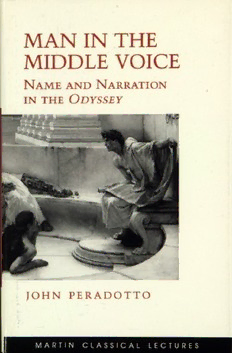
Man in the Middle Voice: Name and Narration in the Odyssey (Martin Classical Lectures, New Series) PDF
213 Pages·1990·13.416 MB·English
Most books are stored in the elastic cloud where traffic is expensive. For this reason, we have a limit on daily download.
Preview Man in the Middle Voice: Name and Narration in the Odyssey (Martin Classical Lectures, New Series)
Description:
Beginning with a diagnosis of the current state of American classical philology, John Peradotto proceeds to concentrate on textual practices of naming and narrating in the Odyssey from a perspective that blends traditional philological with semiotic and narratological techniques. What emerges from this reading is a view of the poem as a tense opposition between "myth" and "folktale," recognized as vehicles for contrasting ideological opinions on the world. With terms drawn from Bakhtin's concept of "dialogism," the Odyssey's two voices are characterized as "centripetal" and "centrifugal"--the one associated with dominant political power, with the conventional, the official, and the heroic; the other, with the personal, the disempowered, and the popular, with the antics of the Autolycan trickster and outlaw. As he examines the more audible, "centrifugal" voice, Peradotto shows how the poet's sense of power over his material, represented in Odysseus' ability to narrate a fictitious world, creates a "character" of infinite varietyone whose self- chosen anonymity becomes a paradigm for a subtler ideology of the self than that embodied in the Iliadic Achilles.
See more
The list of books you might like
Most books are stored in the elastic cloud where traffic is expensive. For this reason, we have a limit on daily download.
